

Julie Voce Imperial college - Project Management. Plan to Learn: Case studies in eLearning Project Management. Project planning: Project management. In the project plan, describe the project management framework, including project organisation, reporting relationships, decision process, and the role of any management committee.
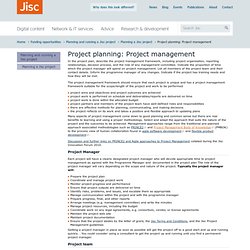
Indicate the proportion of time which the project manager will spend on project management. List all members of the project team and their contact details. Inform the programme manager of any changes. Indicate if the project has training needs and how they will be met. Project management. There are many definitions of what constitutes a project such as ‘a unique set of co-ordinated activities, with definite starting and finishing points, undertaken by an individual or team to meet specific objectives within defined time, cost and performance parameters’ (Office of Government Commerce).
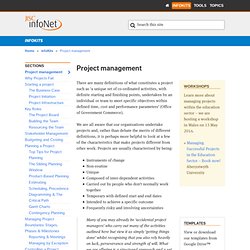
We are all aware that our organisations undertake projects and, rather than debate the merits of different definitions, it is perhaps more helpful to look at a few of the characteristics that make projects different from other work. Projects are usually characterised by being: Instruments of changeNon-routineUniqueComposed of inter-dependent activitiesCarried out by people who don’t normally work togetherTemporary with defined start and end datesIntended to achieve a specific outcomeFrequently risky and involving uncertainties There is no magic formula for ensuring that a project is successful, but there are well proven techniques available to help plan and manage projects. Project planning: Project management. Secrets of mlearning failures: confronting reality. Abstract Having implemented and evaluated over 35 mlearning projects in a variety of contexts in higher education over the past 6 years the researcher is ready to share the untold secret: not all mlearning projects succeed!
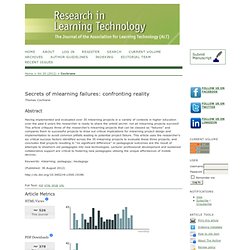
This article critiques three of the researcher’s mlearning projects that can be classed as ‘‘failures’’ and compares them to successful projects to draw out critical implications for mlearning project design and implementation to avoid common pitfalls leading to potential project failure. This article uses the researcher’s six critical success factors identified across the 35 mlearning projects to evaluate these three projects, and concludes that projects resulting in ‘‘no significant difference’’ in pedagogical outcomes are the result of attempts to shoehorn old pedagogies into new technologies.
Lecturer professional development and sustained collaborative support are critical to fostering new pedagogies utilising the unique affordances of mobile devices. HTML Views. "It's all about the learner" - Rachel Wenstone at altc2013. NUS Manifesto For Partnership. Student Engagement Toolkit. Welcome to the student engagement toolkit: these pages, a result of the 2009-2011 NUS/HEA Student Engagement Project, are designed for students' unions and institutions to work together enhancing students' academic engagement.
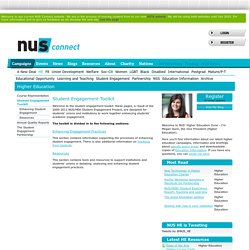
The toolkit is divided in to the following sections: Enhancing Engagement Practices This section contains information supporting the processes of enhancing student engagement. There is also additional information on feedback from students. Resources This section contains tools and resources to support institutions and students' unions in debating, analysing and enhancing student engagement practices.
Engaging With Academics in Use of TEL. Project Management for Instructional Designers. 20-14_ISTE_Standards-T_PDF.pdf. Buyersupplier.pdf. LTTO Episodes - Online Teamwork and Collaboration. Enhancing curriculum design. Download the publication (PDF) 1 Download the publication (accessible PDF) 2 Download the text only version 3 Enhancing Curriculum Design with Technology (2013) is a short accessible publication that provides points for discussion, pragmatic tips and hands-on resources drawn from the Jisc Institutional Approaches to Curriculum Design 4 programme to enable those involved in curriculum design and approval in higher education to enhance their practices through the use of technology.
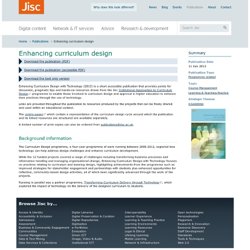
Links are provided throughout the publication to resources produced by the projects that can be freely shared and used within an educational context. The centre pages 5 which contain a representation of the curriculum design cycle around which the publication and its linked resources are structured are available separately.
A limited number of print copies can also be ordered from publications@jisc.ac.uk 6 . Background information. UK Quality Code for Higher Education - Chapter B5: Student engagement. Description The Quality Code is the definitive reference point for all those involved in delivering higher education which leads to an award from or is validated by a UK higher education provider.
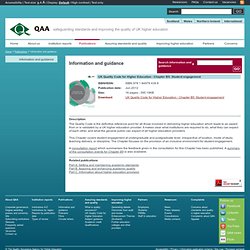
It makes clear what institutions are required to do, what they can expect of each other, and what the general public can expect of all higher education providers. This Chapter covers student engagement at undergraduate and postgraduate level, irrespective of location, mode of study, teaching delivery, or discipline. The Chapter focuses on the provision of an inclusive environment for student engagement. A consultation report which summarises the feedback given in the consultation for this Chapter has been published. Lisa Carrier. Developing staff digital literacies. Almpanis - Academic staff develoment in TEL in HEIs. PRINCE2 - PRojects IN Controlled Environments Home.